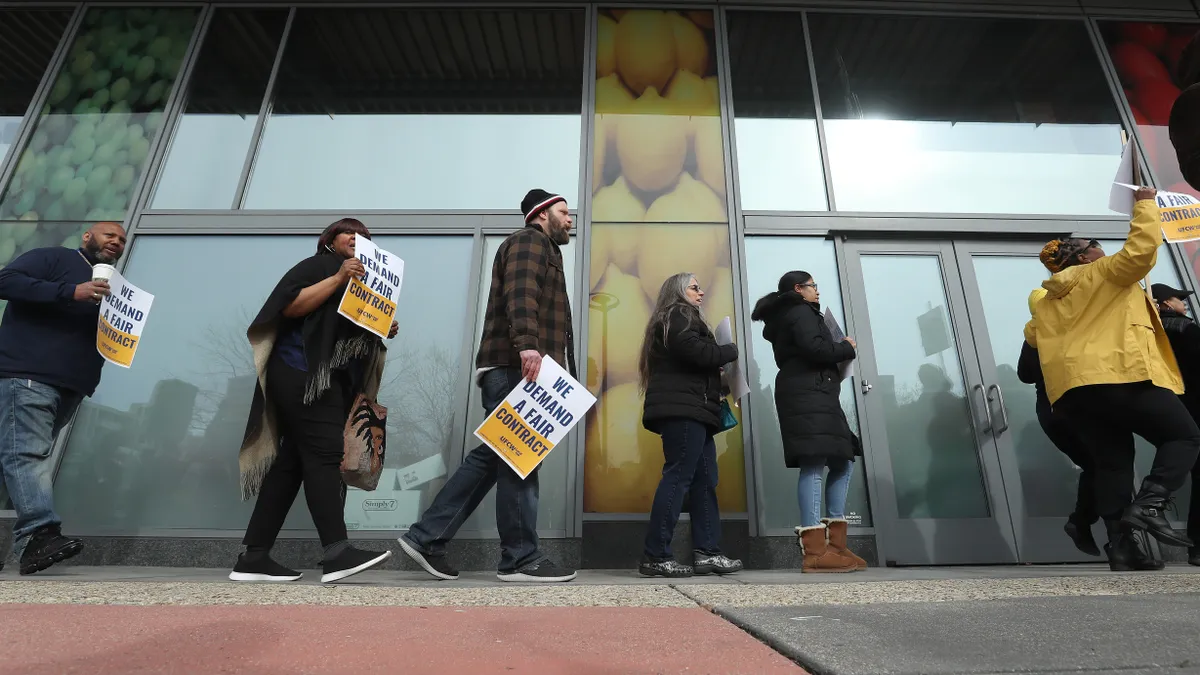Anthony Abbatiello and Julia Lamm are both partners in the workforce transformation practice at PwC.
Investing in trust has never been more critical. Amidst a tumultuous economic landscape and evolving expectations of both employers and employees, 91% of executives say that their ability to earn and maintain trust improves the bottom line, according to PwC’s 2023 Trust Survey.
But the same conditions that make trust so valuable can also make the road to earning it feel unsteady. How can employers lead with empathy while also being responsive to the market? If layoffs have to happen, how can they cause the least damage to company culture?
According to PwC’s 2023 Global Hopes & Fears Survey, the percentage of employees who say they have money left over at the end of the month declined to 38% in 2023, down from 47% in 2022. In an environment like this, where employees increasingly feel the impact of a tumultuous market, compassionately connecting with them can be the key to building trust, enhancing culture and driving successful organizational transformations.
Workforce reductions hurt, but they don’t have to erode trust.
Market conditions have forced workforce reductions across industries in the last 12 months. And at the same time, the “great resignation” is not slowing down: 26% of employees worldwide say they plan to quit their job in the next 12 months, up from 19% last year.
Employers are challenged to create a transparent company culture that encourages retention and stops trust from eroding during difficult times. Although most employees (80%) recognize that layoffs can have a negative impact on their trust in an organization, they also identify specific actions that may help: encouraging managers to increase communications with remaining team members (58%), offering generous severance packages (57%), and being more transparent about the reasons for layoffs (57%).
However, executives aren’t nurturing these opportunities, only 38% say they’re encouraging managers to increase communications, 32% are offering generous severance packages and 35% are being more transparent about the reasons for layoffs.
The opportunity: Assess and balance the needs of multiple stakeholder groups in order to maintain trust. Organizations have an opportunity to be more transparent and proactive about how they support employees who are released from the company, as well as the remaining workforce impacted by those departures.
Employees hold the key to trust blind spots
PwC’s 2023 Trust Survey shows that 46% of employees who had a trust-damaging event in the last year say they expected the event to occur. By listening closely, organizations might be able to identify and avoid damaging events before they hit.
Through their day-to-day work and firsthand information, employees have a valuable role as a “trust barometer" within organizations — with power to uncover potential blind spots regarding trust. In fact, internal trust-breaking events are far more common than business leaders may think. About half of employees (54%) report experiencing a trust-damaging event, while only 20% of business executives say their organization has experienced this type of incident.
Why such a stark difference? Employees identify daily, personal experiences as causes of broken trust — with 33% saying that bias or mistreatment caused a loss of trust. And more than half (53%) report that they left the company after the experience. On the other hand, executives say that large-scale organizational crises like security (15%), legal and compliance (11%), and, to a lesser extent, financial issues and system failures, are more likely to be trust-breaking events.
The opportunity: To get smarter at building trust and creating value, start with strong listening, both inside and outside the organization. By developing a culture where workers feel empowered enough to speak up and feel heard, leaders can shape strategy, identify future issues and build stronger relationships. Social listening and online monitoring of employee review websites can also help uncover challenges that might not be shared directly in open forums.
Inspire your workforce with trust-building actions
More employees than ever are grappling with financial hardship. And PwC research shows that in addition to harming emotional and physical well-being, financial stress can also hurt their productivity and engagement.
How can organizations better support their employees during difficult times and fuel critical transformations? The formula will be different for every organization but might include cost-of-living salary increases, enhanced financial wellness employee assistance programs, and upskilling initiatives.
PwC’s 2023 Global Workforce Hopes and Fears Survey shows that employees without specialized training are more likely to be struggling to pay their bills (17%), compared with 11% of respondents who had specialized skills.
Employers can earn trust by helping their workforce build the digital and human skills necessary to succeed and thrive.
The opportunity: Approach organizational strategy holistically with a trust lens and invest in activities that can drive impact both inside and outside the organization. 80% of employees say that fair pay is “very important” to building trust, followed by data protection, clear communications, and flexible working arrangements. In the midst of transformation, leaders can stay attuned to how structural changes and emerging technologies impact their employees — and take steps to protect against burnout and unmanageable workloads.
The big takeaway
Organizational trust extends far beyond interpersonal relationships, team dynamics and brand perception. When executive teams make trust a priority across business dimensions, they can be better equipped to shape a resilient workforce in the face of change — and a culture worthy of emulation. This can be achieved through closer listening and collaboration with employees, by understanding the trust gaps that exist in current company culture and focusing workforce strategy on the most powerful trust-building opportunities.




















